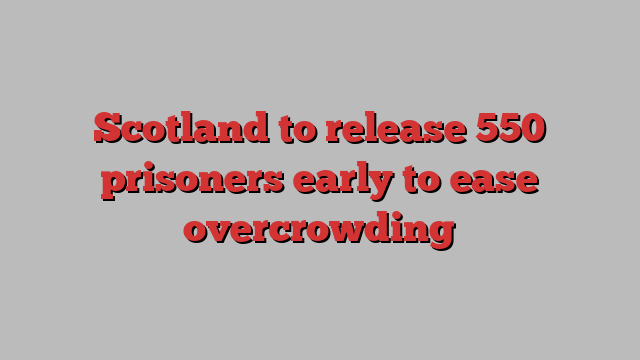
Unlock the Editor’s Digest for free
Roula Khalaf, Editor of the FT, selects her favourite stories in this weekly newsletter.
About 550 prisoners in Scotland are set to be released early from the end of June to ease overcrowding at prisons described by the devolved government as “an unprecedented situation”.
The Scottish parliament will be asked to endorse the emergency release of short-term prisoners in legislation previously introduced to Holyrood two weeks ago by the government, justice secretary Angela Constance said.
Regulations for the release were detailed at Holyrood on Wednesday.
“Emergency early release has become necessary to ensure the safety and wellbeing of Scottish Prison Service staff and those in their care as a result of the rapid rise in the prison population, creating an unprecedented situation,” she said in a statement.
An increase of roughly 400 prisoners over the past two months could not have been anticipated and was a challenge faced by other administrations in the UK, she added, noting public safety would remain paramount.
Scotland’s current prison population is 8,313, down from 8,348 two weeks ago, one of the highest levels recorded when Constance introduced the emergency legislation. Some prisoners were released early during the coronavirus pandemic.
People serving sentences of fewer than four years who are scheduled for release within six months will be eligible for release. The emergency releases will come in four tranches to allow support for their resettlement.
Prisoners to be excluded from the release programme include those serving life sentences or on the sex offenders’ register, as well as prisoners subject to non-harassment orders or who have an unspent conviction for domestic abuse.
Constance said victim support organisations would be provided release dates for prisoners, where requested by those affected by their crimes. “I recognise concerns victims may have,” she added.
The emergency releases sparked criticism from opposition parties.
Pauline McNeill, Scottish Labour’s justice spokesperson, said the move was “a direct result of the SNP’s failure to modernise the prison estate and tackle the courts backlog”.
Crime has been falling in Scotland, with the number of people entering prison falling from 14,900 in 2011-12 to 8,400 in 2022-23, according to official figures. But the prison population has nonetheless risen.
On introducing the emergency legislation this month, Constance described the 5 per cent jump in the prison population over two months as a “critical risk”, undermining the prison service’s ability to provide rehabilitation, facilitate visits and deliver health services.
Multiple prisons were “essentially full”, she said.
Other measures being used to limit the strain on Scottish prisons include electronically monitored bail. In July, courts will be able to take into account time spent on electronically monitored bail when sentencing.
Another justice bill later this year should end the imprisonment of under-18s, freeing up capacity at Polmont prison, the only one for youths.

